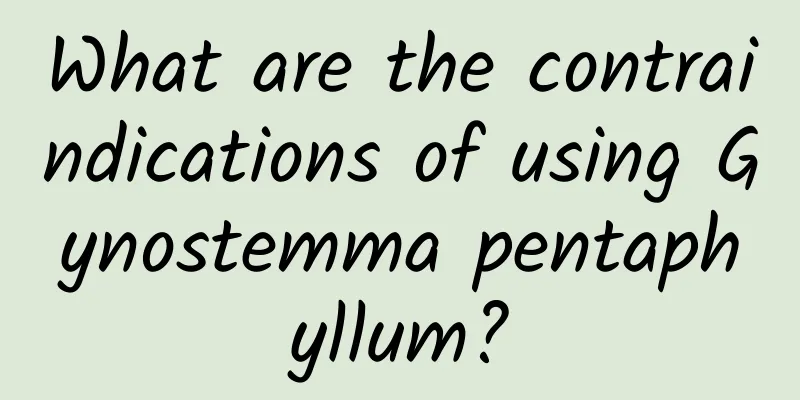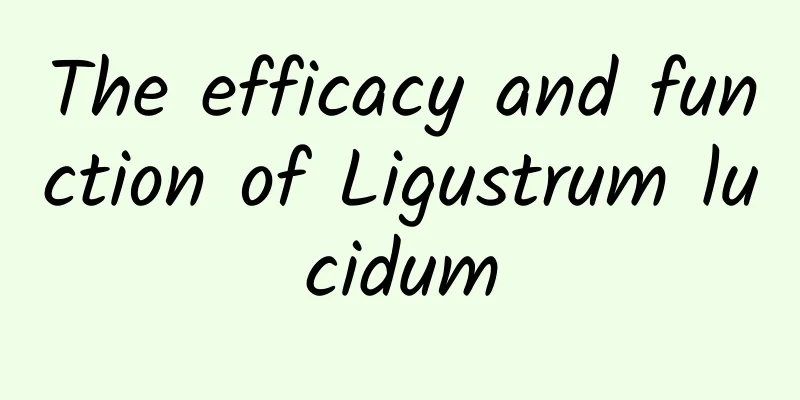What are the contraindications of using Gynostemma pentaphyllum?

|
Today, I would like to recommend a Chinese herbal medicine to you. Its name is Gynostemma pentaphyllum, which is known as the "Southern Ginseng". The medicinal content of Gynostemma pentaphyllum grown in the south is relatively high. People call it the magical "immortality and longevity herb". The medicinal value of Gynostemma pentaphyllum is so great, so, is there anything you need to pay attention to when taking it? Today, let’s learn about the contraindications of using Gynostemma pentaphyllum. Gynostemma pentaphyllum, also known as heaven grass, gospel grass, super ginseng, male Luoguodi, roots everywhere, seven-leaf gall, five-leaf ginseng and seven-leaf ginseng, is a herbaceous climbing plant of the Cucurbitaceae family and the genus Gynostemma. It has a slender, branched stem with longitudinal ridges and grooves, and is glabrous or sparsely covered with short soft hairs [1]. It is called sweet tea in Japan. Gynostemma pentaphyllum prefers a humid and mild climate. It mostly grows wild in shady places such as under forests and beside streams. It is a perennial climbing herb. In China, it is mainly distributed in Pingli, Shaanxi, Kangxian, Gansu, Hunan, Hubei, Yunnan, Guangxi and other provinces. It is known as the "Southern Ginseng". The medicinal content of Gynostemma pentaphyllum grown in the south is relatively high. People call it the magical "immortality and longevity herb". In 1986, the State Science and Technology Commission listed Gynostemma pentaphyllum as the first of the "precious Chinese medicinal materials" to be developed in the "Spark Plan". On March 5, 2002, the Ministry of Health included it in the list of health products. This species is used as medicine, and has the effects of anti-inflammatory, detoxification, cough and expectoration. Jiaogulan is the most important, with the following Chinese medicinal properties: Boiling Gynostemma pentaphyllum and Ganoderma lucidum in water or making tea with them can treat high blood pressure, high blood lipids, high blood sugar, fatty liver and other diseases. It has the effects of protecting the liver and detoxifying, lowering blood pressure, and lowering blood lipids and blood sugar. The main active ingredients of Gynostemma pentaphyllum are gypenosides, gypenosides (polysaccharides), water-soluble amino acids, flavonoids, multiple vitamins, trace elements, minerals, etc. Medicinal material source: the whole herb of Gynostemma pentaphyllum, a plant of the Cucurbitaceae family. Nature and flavor: bitter; slightly sweet; cool in nature. Meridians: Lung, spleen, and kidney meridians. Efficacy: tonifies Qi and strengthens the spleen, resolves phlegm and relieves cough, clears away heat and detoxifies. Efficacy classification: tonic medicine; expectorant medicine; heat-clearing medicine. Indications: physical weakness; consumptive spermatorrhea; leukocytopenia; hyperlipidemia; viral hepatitis; chronic gastroenteritis; chronic tracheitis. Dosage and Administration: For oral use: decoct in water, 15-30g, grind into powder, 3-6g; or make into tea. For external use: take appropriate amount, mash and apply on the affected area. Harvesting and storage: It can be harvested 3-4 times in summer and autumn every year, washed and dried. Contraindications: A small number of patients experience nausea and vomiting, abdominal distension, diarrhea (or constipation), dizziness, blurred vision, tinnitus, etc. after taking the medicine. If the above symptoms occur, you can stop taking the medicine and rest. People who are allergic to Gynostemma pentaphyllum dust will experience soreness and fatigue in the limbs, dizziness, headache, chest tightness, dry and itchy nasopharynx, and accelerated heart rate. Tea made from Gynostemma pentaphyllum has great benefits for the human body. Gynostemma pentaphyllum tea is extracted from the tender buds and dragon whiskers in the axils of Gynostemma pentaphyllum leaves. The tea soup is clear and can be brewed continuously for 4-6 cups without losing its color. It has health care functions brought by the nutrients contained in the growth point and can be drunk for a long time without any toxic side effects. Effects and functions: Lowers blood lipids, regulates blood pressure, prevents and treats thrombosis, prevents and treats cardiovascular diseases, regulates blood sugar, promotes sleep, slows down aging, prevents and fights cancer, improves immunity, and regulates human physiological functions. Gynostemma pentaphyllum can protect the adrenal glands, thymus and endocrine organs from atrophy with age, maintain the function of the endocrine system, and has the effects of lowering blood sugar and improving sugar metabolism. Well, that’s all we have to say about the incompatibility taboos of Gynostemma pentaphyllum today. I believe everyone has a certain understanding in this regard. Although Gynostemma pentaphyllum is a good tonic, everyone should remember one thing: all medicines are poisonous to the point of being toxic. Never be greedy just because the medicinal material has powerful functions, and then do something that you will regret later. |
<<: How to cultivate Drosera serrata
>>: What are the contraindications of Astragalus?
Recommend
Who could be the real culprit behind the Beihai wounding incident?
A few days ago, at Qiaogang Beach in Guangxi, sev...
The warmest winter in Sichuan is here!
This is the most unfamiliar scenery in Sichuan, a...
Micro Hotspot WRD: 5A-level scenic spots online attention list in February 2023
The People's Cultural Tourism Research Instit...
2012 eBay Greater China Foreign Trade E-commerce Report – Data Infographic
On December 10, 2012, data from the "eBay Gr...
How to deal with this skin disease that sounds like a plant name?
Urticaria, a disease name that sounds like a plan...
The efficacy and function of Glechoma longituba
Traditional Chinese medicine often has unexpected...
Can Panax notoginseng powder and Ganoderma lucidum be taken together?
Panax notoginseng has the effects of promoting bl...
Science in the spotlight this week | Probe enters solar atmosphere for the first time
2021 Week 51 Issue 16 Total Issue 362 Here is the...
Bernstein: Temu's GMV is expected to reach US$54 billion in 2024 and has achieved profitability in the United States
Bernstein has published an interesting report pre...
The efficacy and function of jujube tree roots
Everyone is familiar with the roots of jujube tre...
The science behind hangovers is actually...
According to a report on the U.S. News Weekly web...
What is the difference between cinnamon and cassia?
Cinnamon and cassia bark are very common in daily...
The efficacy and function of Feilong Palm Blood Leaf
The blood leaf of Feilong Palm is a traditional C...
The efficacy and function of green feather grass
The nutritional value of green feather grass is r...
The efficacy and function of Euonymus sinensis
Euonymus sinensis is a very nutritious and precio...









